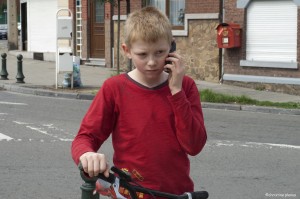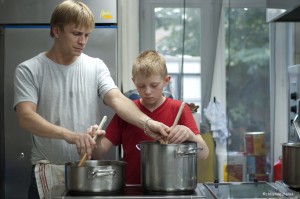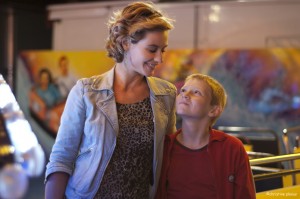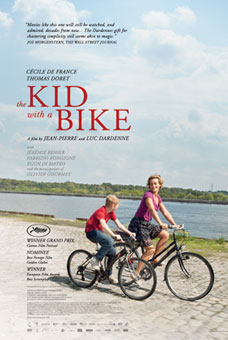LOSING A BIKE AND A FATHER AT THE SAME TIME
Jean-Pierre and Luc Dardenne are always burrowing deep into the dirty soil from which we all presumably come. Life, to these extraordinary Belgian filmmakers, is hard and mean and filled with consequences that are not merely challenging but driven through with pain and despair. And, sometimes, even in the midst of the harshest revelations that come to us, there is some hint of purity that is a sort of omen that redemption is always possible. Anyone who has seen The Son or The Child will recognize in their new film, The Kid With a Bike, the Dardennes’ particular affinity for implosive father-and-son relationships. This may be their darkest and most cruel look at such a relationship; it is also the most heartbreakingly redemptive. Talk about grace under pressure.
 Cyril is an 11-year-old who has been abandoned by his father, who has also absconded with Cyril’s bicycle for some quick cash. From the start, Cyril’s unbridled and troublesomely unpredictable behavior drives everyone up the wall as he crazily tries to locate his lost bike and his lost dad. We are so inside his head that, like him, we run a jagged course through his tragic pursuit. When he finally discovers the bike, we are out in the sunshine with him cycling around Liège. The freedom of the moment liberates us as well as it does Cyril. Finding his father closes us up again as we experience some of the confused pain Cyril feels, not understanding why he is being rejected.
Cyril is an 11-year-old who has been abandoned by his father, who has also absconded with Cyril’s bicycle for some quick cash. From the start, Cyril’s unbridled and troublesomely unpredictable behavior drives everyone up the wall as he crazily tries to locate his lost bike and his lost dad. We are so inside his head that, like him, we run a jagged course through his tragic pursuit. When he finally discovers the bike, we are out in the sunshine with him cycling around Liège. The freedom of the moment liberates us as well as it does Cyril. Finding his father closes us up again as we experience some of the confused pain Cyril feels, not understanding why he is being rejected.
Cyril fortunately has a guardian angel in the form of a warm and compassionate hairdresser Samantha, but he is apt to willfully upset her as he persists in taking a journey to the truth that involves some desperate attempts at finding any father upon whom he can depend. This is the sum of the film, but it doesn’t begin to articulate the cinematic intensity that the Dardennes bring to bear on their story. It moves forward with a kind of certainty that lets nothing stand in its way, but remains fascinating because we, the audience, are as stymied by the journey as Cyril is at every turn.
 The Kid With a Bike shares something in common with Vittorio deSica’s Bicycle Thieves; but whereas, in that film, the boy helps his father retrieve a stolen bicycle, here Cyril needs the bike to find his father – and, once found, the father remains outside Cyril’s grasp. What The Kid With a Bike really shares with deSica’s film is what it shares with all great films about childhood (a list that includes such masterpieces as Forbidden Games and The Fallen Idol): a look into the inchoate sensibilities that shape a child’s growth.
The Kid With a Bike shares something in common with Vittorio deSica’s Bicycle Thieves; but whereas, in that film, the boy helps his father retrieve a stolen bicycle, here Cyril needs the bike to find his father – and, once found, the father remains outside Cyril’s grasp. What The Kid With a Bike really shares with deSica’s film is what it shares with all great films about childhood (a list that includes such masterpieces as Forbidden Games and The Fallen Idol): a look into the inchoate sensibilities that shape a child’s growth.
This may not have been possible without the brilliant naturalness of its young star, Thomas Doret. This is not so much acting, as it is acting out in front of a camera. How the Dardennes managed to get so much of Cyril’s anguish on the screen without doing anything that suggests a performance on the part of Doret is pure magic. Cécile de France brings tenderness to the character of Samantha and Jérémie Renier has some telling moments as Cyril’s wayward father, who is trying as hard as Cyril to forge a new life for himself, a fact that doesn’t make his behavior seem less cruel.
 The Kid With a Bike explores some of the mysteries of childhood with a toughness and complexity and a pictorial up-closeness that is equally simple and demanding and, as it moves towards grace, never becomes sentimental. That the young Master Doret is so startlingly real is the reason it achieves that grace.
The Kid With a Bike explores some of the mysteries of childhood with a toughness and complexity and a pictorial up-closeness that is equally simple and demanding and, as it moves towards grace, never becomes sentimental. That the young Master Doret is so startlingly real is the reason it achieves that grace.
The Kid With a Bike (Le gamin au vélo)
not rated
now playing in select theaters
